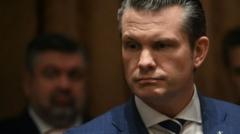The ramifications of this pause raise questions about the US's cyber capabilities and its commitment to supporting Ukraine amid ongoing aggression from Russia.
**US Pauses Cyber Offensive Against Russia Amidst Changing Diplomatic Tides**

**US Pauses Cyber Offensive Against Russia Amidst Changing Diplomatic Tides**
The Trump administration's decision to halt cyber operations marks a shift in US strategy towards Russia as peace talks around the Ukraine conflict intensify.
The Trump administration has announced a sudden pause in its cyber offensive operations against Russia, coinciding with ongoing diplomatic efforts aimed at brokering peace in Ukraine. While officials have not provided specific reasoning for this directive, it has added another layer of complexity to an already tense geopolitical landscape.
This decision, driven by Defence Secretary Pete Hegseth, precedes a heated exchange between President Trump and Ukrainian President Volodymyr Zelensky at the White House, highlighting the shifting tone of US-Russia relations. After over three years of conflict triggered by Russia’s invasion, Trump’s approach has notably softened, showing a growing eagerness for negotiations with Moscow.
Reports suggest that the hiatus could affect hundreds, if not thousands, of personnel within US Cyber Command, casting a shadow over the ongoing battle against Russian cyber incursions that have previously targeted various Western nations in support of Ukraine. A senior defence official hinted at operational security concerns but reaffirmed the necessity of prioritizing protection for American forces engaged in cyber efforts.
National Security Adviser Mike Waltz has publicly denied any formal policy changes while acknowledging that the administration is pursuing diplomatic tactics, which he referred to as "carrots and sticks," in its attempts to end the conflict. Senior members of Trump's circle have defended this shifting stance, arguing against a hostile approach towards Russia, which they contend would hinder constructive dialogue.
Critics, including Senate Minority Leader Chuck Schumer, have condemned the strategic pause, labeling it a critical mistake that inadvertently empowers Russia amid its ongoing cyber attacks against US infrastructure. The implications of this pause, viewed alongside Trump’s recent comments on Zelensky and the conflict, remain unclear as both domestic and international observers monitor the unfolding situation closely.
This decision, driven by Defence Secretary Pete Hegseth, precedes a heated exchange between President Trump and Ukrainian President Volodymyr Zelensky at the White House, highlighting the shifting tone of US-Russia relations. After over three years of conflict triggered by Russia’s invasion, Trump’s approach has notably softened, showing a growing eagerness for negotiations with Moscow.
Reports suggest that the hiatus could affect hundreds, if not thousands, of personnel within US Cyber Command, casting a shadow over the ongoing battle against Russian cyber incursions that have previously targeted various Western nations in support of Ukraine. A senior defence official hinted at operational security concerns but reaffirmed the necessity of prioritizing protection for American forces engaged in cyber efforts.
National Security Adviser Mike Waltz has publicly denied any formal policy changes while acknowledging that the administration is pursuing diplomatic tactics, which he referred to as "carrots and sticks," in its attempts to end the conflict. Senior members of Trump's circle have defended this shifting stance, arguing against a hostile approach towards Russia, which they contend would hinder constructive dialogue.
Critics, including Senate Minority Leader Chuck Schumer, have condemned the strategic pause, labeling it a critical mistake that inadvertently empowers Russia amid its ongoing cyber attacks against US infrastructure. The implications of this pause, viewed alongside Trump’s recent comments on Zelensky and the conflict, remain unclear as both domestic and international observers monitor the unfolding situation closely.






















